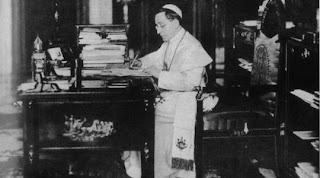"I say to you, love your enemies, do good to those who hate you, and pray for those who persecute and calumniate you, so that you may be children of your Father in heaven, Who makes His sun to rise on the good and the evil, and sends rain on the just and the unjust." (Gospel, Mass for Friday after Ash Wednesday, St. Matthew v, 44-45)
You know well, and We have frequently reminded you of it, nothing was so often and so carefully inculcated on His disciple by Jesus Christ as this precept of mutual charity as the one which contains all others. Christ called it the new commandment, His very own, and desired that it should be the sign of Christians by which they might be distinguished from all others; and on the eve of His death it was His last testament to His disciples to love one another and thus try to imitate the ineffable unity of the three Divine Persons in the Trinity. "That they may be one as we also are one ... that they may be made perfect in one".
The Apostles, following in the steps of the divine Master, and conforming to His word and commands, were unceasing in their exhortation to the faithful: "Before all things have a constant mutual charity among yourselves". "But above all these things have charity which is the bond of perfection". "Dearly beloved, let us love one another for charity is God."
Our brethren of the first Christian ages faithfully observed these commands of Jesus Christ and the Apostles. They belonged to different and rival nations; yet they willingly forgot their causes of quarrel and lived in perfect concord, and such a union of hearts was in striking contrast with the deadly enmities by which human society was then consumed.
What has already been said in favour of charity holds good for the inculcation of the pardoning of injuries which is no less solemnly commanded by the Lord: "But I say to you, love your enemies; do good to them that hate you; pray for those that persecute you and calumniate you, that you may be the children of your Father who is in Heaven, Who maketh His sun to rise upon the good and the bad". Hence that terribly severe warning of the Apostle St. John. "Whosoever hateth his brother is a murderer. And you know that no murderer hath eternal life abiding in himself."
Our Lord Jesus Christ, in teaching us how to pray to God, makes us say that we wish for pardon as we forgive others: "Forgive us our trespasses as we forgive them that trespass against Us." And if the observance of this law is sometimes hard and difficult, we have not only the timely assistance of the grace of Our Divine Redeemer, but also His example to help us to overcome the difficulty. For as He hung on the Cross He thus excused before his Father those who so unjustly and wickedly tortured Him: "Father, forgive them, for they know not what they do."
We then, who should be the first to imitate the piety and loving kindness of Jesus Christ, whose Vicar, without any merit of Our own, We are; with all Our heart, and following His example, We forgive all Our enemies who knowingly or unknowingly have heaped and are still heaping on our person and Our work every sort of vituperation, and We embrace all in Our charity and benevolence, and neglect no opportunity to do them all the good in Our power. ...
Christian charity ought not to be content with not hating our enemies and loving them as brothers; it also demands that we treat them with kindness, following the rule of the Divine Master Who "went about doing good and healing all that were oppressed by the devil", and finished His mortal life, the course of which was marked by good deeds, by shedding His blood for them. ...
It is Our especial wish that you should exhort your priests, as the ministers of peace, to be assiduous in urging this love of one's neighbour and even of enemies which is the essence of the Christian life, and by "being all things to all men" and giving an example to others, wage war everywhere on enmity and hatred, thus doing a thing most agreeable to the loving Heart of Jesus and to him who, however unworthy, holds His place on earth. In this connection Catholic writers and journalists should be invited to clothe themselves "as elect of God, holy and beloved, with pity and kindness." Let them show this charity in their writings by abstaining not only from false and groundless accusations but also from all intemperance and bitterness of language, all of which is contrary to the law of Christ and does but reopen sores as yet unhealed, seeing that the slightest touch is a serious irritant to a heart whose wounds are recent.
Benedict XV
Pacem Dei munus pulcherrimum
